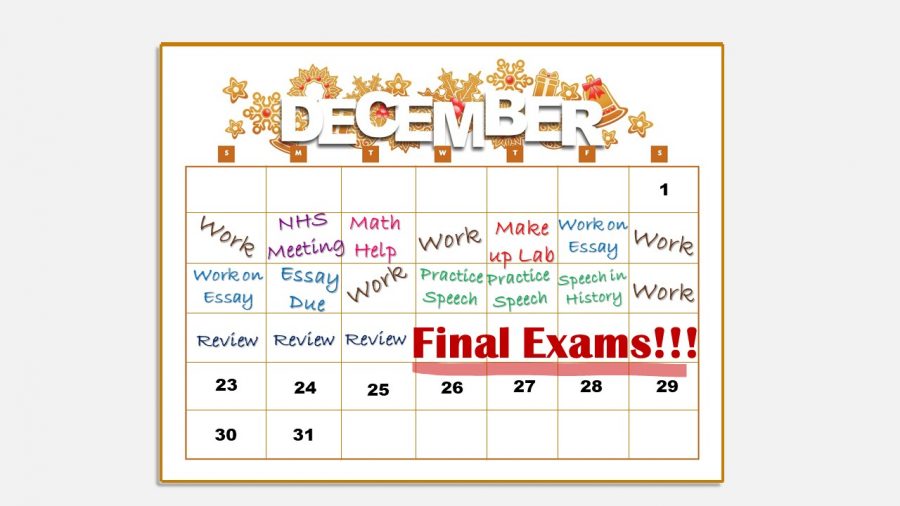Cumulative assessments make students’ stress level spike
December 14, 2018
If a person looks around and sees students looking exhausted and flipping through flashcards, chances are they are stressing about upcoming final exams.
Long term or severe stress can have very negative effects on the body and a person’s mental health. This is becoming a nationwide problem for today’s youth.
The definition of stress is being in a mental or emotional state of suspension or strain. Stressing out about tests and assessments only hinders performance levels.
“Students often report anxiety related to the increasing numbers of tests which intend to evaluate their level of competence on a given topic,” North psychologist Diana Klemetson said.
According to Klemetson, students who experience test anxiety tend to worry a lot and even develop stomachaches and nausea, but anxiety is only part of the broad spectrum of examination stress, and parents do not make it any easier.”
“I…feel that parents… make a big deal out of grades which makes me feel pressured to do well,” junior Lela Lazic said.
In Dr. Justin Laube’s article “How Stress Affects Your Body, from Your Brain to Your Digestive System” he talks about all the different effects stress has on a person’s health. According to Laube, if a person’s stress becomes long term and “[l]eft unchecked, severe stress — the kind that continues for months or years — is more apt to lead to serious illness than short-term stressors do.”
Stress hormones can affect a person’s sleep leading to an increased risk of high blood pressure, heart disease and stroke. There is also an increased risk of anxiety and depression.
In the article “Stress and Heart Health” The American Heart Association indicates that “[m]ore research is needed to determine how stress contributes to heart disease… [b]ut stress may affect behaviors and factors that increase heart disease risk: high blood pressure and cholesterol levels, smoking, phyisical inactivity and overeating. Some people may choose to drink too much alcohol or smoke cigarettes to `manage` their chronic stress; however, these habits can increase blood pressure and may damage artery walls.”
When stressed, the body releases the adrenaline hormone which causes a person’s blood pressure to increase and heart rate to speed up. This is the body’s way of preparing an individual for the ‘flight or fight” stress response, and the after effects of constant stress continue on and off for weeks.
The article “Examination Stress and Test anxiety” published by the British Psychological Society claimed that “[w]hether one adopts a test anxiety or examination stress perspective, they have both been associated with a negative impact on examination performance.”
Upon reviewing research studies conducted in universities and other schools, the society found that poor performances and raging anxiety are products of poor studying skills.
“The times I didn’t study I was freaking out because I didn’t know anything, and I felt like I just ran a mile,” senior Alicia Sinclair said.
A survey by the Naperville Sun concluded that 50% of teenagers won’t talk about being stressed out and that 70% of them currently are.
“Seven of 10 seventh-graders and nearly eight in 10 high school sophomores say they experience moderate or high levels of daily stress,” contact reporter Suzanne Baker said. “About half of both groups say the stress makes it difficult to perform daily tasks because they’re overwhelmed by anxiety and they lack focus and the ability to concentrate.”
According to Thomas J. Huberty, director of the psychology program and professor at Indiana University, some ways students can reduce stress are by making rhymes to help them remember the material as well as avoiding sarcasm, criticism and other negative comments.
“Mnemonic devices…really do save your grade… The more they rhyme, the more likely I [remember what we learned],” Sinclair said.
Dr. Alex Lickerman in his article “Eight Ways to Remember Anything” said the key to remember learned material is by becoming interested in what is being taught, creating a mental memory tree and figuring out how to leverage visual memory as it has been proven that humans remember things in small quantities better than chunking them together.
“If you’re trying to memorize a large number of facts, find a way to relate them in your mind visually with a memory tree…” Lickerman said. “Branches and leaves should carry labels that are personally meaningful to you in some way, and the organization of the facts …should be logical.”


